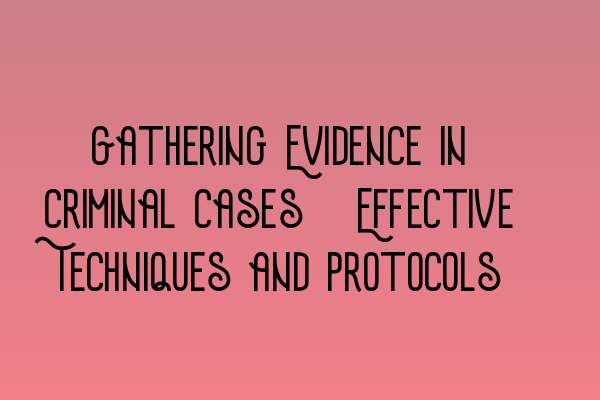Gathering Evidence in Criminal Cases: Effective Techniques and Protocols
In today’s fast-paced criminal justice system, the gathering of evidence plays a crucial role in determining the outcome of a case. Effective techniques and protocols must be implemented to ensure that all relevant evidence is obtained and properly documented. This blog post will explore some of the best practices for gathering evidence in criminal cases.
The Importance of Gathering Evidence
Gathering evidence is the foundation of any criminal case. It provides the necessary facts and information to support or refute the charges against an individual. Without proper evidence, it becomes difficult to prove someone’s guilt or innocence beyond a reasonable doubt. Therefore, it is essential for solicitors and legal professionals to have a comprehensive understanding of the techniques and protocols involved in evidence gathering.
Effective Techniques for Evidence Gathering
There are several techniques that can be employed to gather evidence in criminal cases. One of the most common methods is conducting thorough interviews and interrogations. By interviewing witnesses, victims, and suspects, solicitors can gather valuable information and testimonies that can contribute to the overall strength of the case.
Another effective technique is the collection and analysis of physical evidence. This can include fingerprints, DNA samples, photographs, and other forms of tangible evidence. Proper preservation and documentation of physical evidence are critical to prevent contamination or tampering, which could jeopardize the credibility of the evidence in court.
Additionally, electronic evidence has become increasingly important in modern criminal investigations. Solicitors must be skilled in collecting and analyzing digital evidence such as emails, social media posts, and surveillance footage. This type of evidence can provide valuable insights and uncover crucial information that may have otherwise gone unnoticed.
Protocols for Evidence Gathering
To ensure the integrity and admissibility of evidence in court, solicitors must adhere to strict protocols during the evidence gathering process. This includes properly documenting the chain of custody for each piece of evidence, ensuring that it is properly secured and handled to maintain its integrity.
It is also essential to comply with legal and ethical guidelines when gathering evidence. Solicitors must be familiar with the rules of evidence and ensure that all evidence is obtained legally and without infringing on the rights of individuals involved in the case.
Conclusion
In conclusion, effective evidence gathering is vital in criminal cases. By employing techniques such as interviews, physical evidence collection, and digital evidence analysis, solicitors can gather the necessary information to build a strong case. It is equally important to follow proper protocols and adhere to legal and ethical guidelines to ensure that the evidence is admissible in court. By mastering these techniques and protocols, solicitors can greatly contribute to the pursuit of justice in the criminal justice system.
For more information on related topics, please refer to the following articles:
- Demystifying the Solicitors Qualifying Examination Format
- LLC Formation Made Simple: Step-by-Step Guide for UK Entrepreneurs
- Business Regulations in the UK: A Comprehensive Overview
- Preparing for the SQE Exam: Strategies and Resources for Success
- SQE Workshops and Webinars: Accelerate Your Exam Preparation
